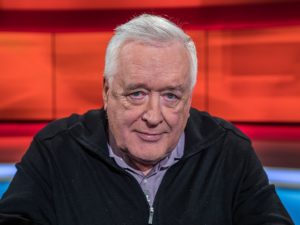by Michael Brüggemann
One of the many privileges of holding a Professorship at the University of Hamburg and being involved in the Cluster of Excellence, which unites researchers from different disciplines around the issue of climate change (see CLICCS website ), is that you have the opportunity to meet and have lunch with highly inspiring and thought-provoking people such as Hans von Storch.

Hans von Storch is the former Director of the Institute for Coastal Research at the Helmholtz Center Geesthacht. He is still highly engaged in research as well as appearing in public debates, and is known for provocative theses on how to tackle climate change. Our talk over lunch covered everything from wild fires to Fridays-For-Future to post-colonialism, (see Hans von Storch’s current article in the newspaper taz), and while we did not fully agree on everything, during our conversation four thoughts related to my research field (climate and science communication) popped up that I would like to share:
Addressed to researchers: Correct misunderstandings and mistakes!
As researches are being interviewed or writing guest contributions, there is a risk of receiving applause from the “wrong” side, or simply being misunderstood. Why are there not more articles and public statements of researchers correcting misinterpretations or admitting mistakes? In Germany, the lead virologist at the Charité in Berlin Christian Drosten is a positive exception of a scientist who transparently lets us participate in his own learning process, in this case on COVID-19, including changing conclusions on what could be the right way to tackle the pandemic.
Addressed to politicians: You are responsible for your decisions and voters should hold you accountable.
It is great to listen to scientists. This listening seems to have been more intense during the COVID-19 pandemic than on the issue of climate change. But no matter how hard you listened, the responsibility for decisions and their impacts rests firmly with politicians. This applies to closing down schools in times of the pandemic as much as to agreeing on how to tackle the climate crisis.
Addressed to journalists: Importance of more diversity in the public debate on climate change.
Why are there always the same few talking heads from science who issue statements about climate change (COVID-19 etc.)? Conspiracy ideologists may assume that they are the secret rulers of the world. However, the lack of diversity in scientists in the public spotlight is essentially a result of the lack of resources and time pressures, such that journalists often address those experts that have already been interviewed by other media. Try to discover new heads providing additional perspectives and ideas!
Addressed to Hollywood and story-tellers around the world: Provide a different story of the good life.
Hollywood (TV in general, but I may also add Netflix, and of course all sorts of advertising) mostly – there are exceptions – spreads one story of the good life around the globe: getting rich, consuming as much as you can. This will somehow make you happy (and beautiful). This narrative is toxic to the world’s climate and ecosystems. Yet, the alternative story and conclusion cannot be abstentation only: resigning on striving for living a good life. The right to happiness may be pursued in other ways that might be turned into entertaining and captivating stories. Sorry, we cannot invent them here, but we are curious for examples! In this respect I would invite you to send me short recommendations (with links to where one may watch, listen to, or read them). We will collect incoming ideas in order to eventually publish a best of, here at climatematters.de